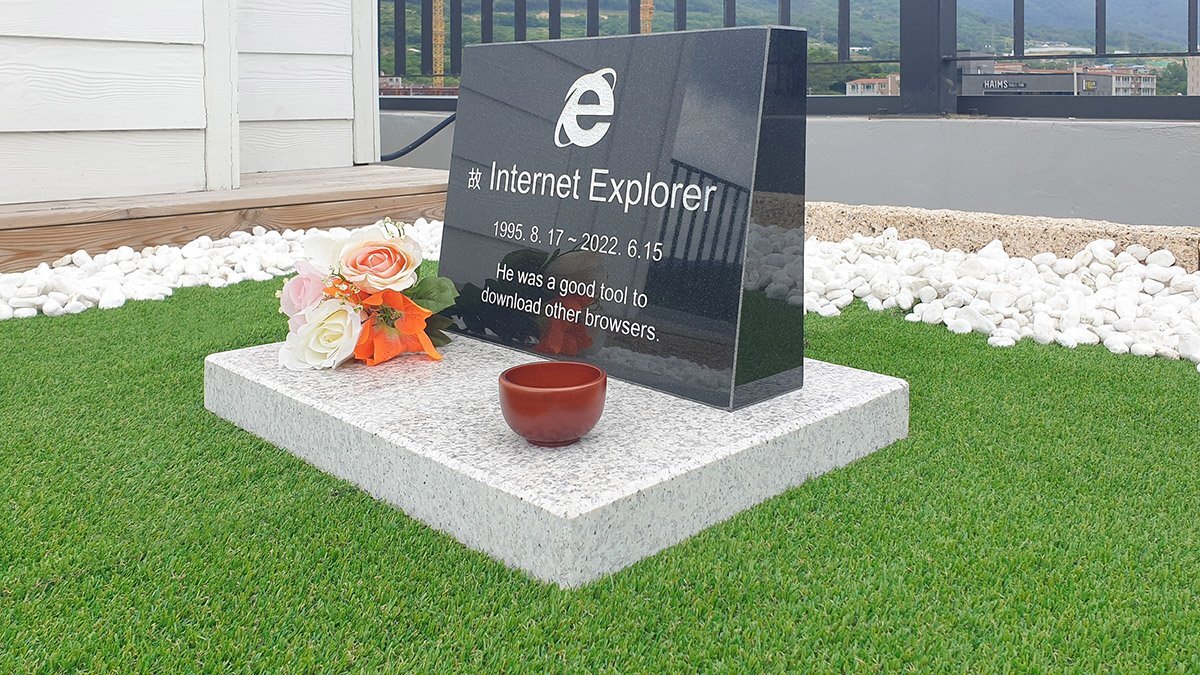
(Soonson Kwon/Twitter)
I think a lot of people have perfectly valid reasons for wanting to stick with the default. The default is easier. It clearly earned its spot at the center of the conversation, curated for your use for a reason
But the problem is, when defaults are allowed to linger with no change, no innovation, that creates risk.
And the conversation about the long-necessary demise of Internet Explorer is definitely one worth discussing for that reason. IE had a long business history that brought it to some of the country’s most prominent courtrooms in famed antitrust debates. It created a lot of business growth and destruction along the way. It fostered a lot of security risks.

Internet Explorer 6 is the reason why Internet Explorer has such a bad reputation. (Web Design Museum)
But I want to make the case that a lot of the reason why we’re living with these issues with IE comes down to the poor stewardship of the browser on the part of Microsoft, which essentially let the browser stay put for five full years with little attempt to modernize it—tying it to the fortunes of Windows XP at a time when the internet was moving far more quickly than any one operating system. During the Internet Explorer 6 era, the company took a fairly complacent approach to updating the browser, failing to do so for years, which both created an opportunity for competition to emerge and encouraged the inertia that allowed IE to become a terrible, monopolistic de facto standard for many years.
Add in the fact that IE was so baked into both Windows and its Office suite of applications, and you have a tool that failed to keep up with users.
It took the development of significantly improved technologies, in the form of Safari, Firefox, and later Chrome, to knock Microsoft out of this inertia.
For its part, Microsoft gets this now, even if it didn’t at the time. From a blog post by Sean Lyndersay, the general manager of Microsoft Edge Enterprise:
To work on a product with such broad impact has been nothing but humbling—our story in many ways is the story of the internet and what it has allowed people and organizations around the world to do.
But the web has evolved and so have browsers. Incremental improvements to Internet Explorer couldn’t match the general improvements to the web at large, so we started fresh.
But I think it tells an important story from a business standpoint. The fact that Microsoft had a hugely important product that it failed to maintain in a timely fashion during its most popular period cast a long shadow over its usefulness for decades to follow. It’s not that IE11 isn’t better than IE6. It’s that when given the pole position with the literal front-facing function of the entire internet, Microsoft took a breather. And that helped to set the stage for IE’s failings for decades after.
All the parents that never upgrade their browser, or the enterprises that built monolithic tools that don’t work well with any other browser besides IE? That’s the legacy Microsoft created by taking its foot off the gas when IE6 was at the center of the digital universe.
That intertia is a big part of the reason why security flaws related to IE and its underlying browser engine will still follow Windows users years from now.
“Internet Explorer as the browser will be gone, but there are still pieces that exist,” security researcher Ronnie Tokazowski told Wired recently.
From a creation perspective, it is tempting when you are on top to not continue to change or evolve, to just coast. But the cautionary tale of IE should shake you out of that line of thinking, if nothing else does.
We’re cynical about IE because, at the moment when it needed to step up and be valuable to more than just Microsoft, Microsoft balked.
The internet suffered.
Time limit given ⏲: 30 minutes
Time left on clock ⏲: 2 minutes, 44 seconds



